Blended Learning

Blended Learning with Serious Games
The evolution of training methods has led to flexible, engaging solutions like Blended Learning, which combines e-learning with face-to-face training for a comprehensive experience. Integrating custom Serious Games makes the learning process more immersive and dynamic, capturing learners’ attention and promoting active engagement.
At Emeraude, we specialise in the creation of customised Serious Games and offer personalised solutions that meet the specific needs of each company. These games are fully adapted to your educational objectives, and fit perfectly into a Blended Learning strategy.
What is Blended Learning?
Blended Learning is a hybrid learning approach that combines the best of two learning styles: the flexibility of e-learning and the human interaction of face-to-face training. By using this method, companies can offer their employees a more complete learning experience that adapts to their needs and pace.
Integrating Serious Games into this strategy brings a fun, immersive aspect to the training. By offering interactive and engaging scenarios, Serious Games encourage learning by doing. They allow complex subjects to be dealt with in an enjoyable way, while making learning sessions more dynamic and less boring.
Why Use Digital Games for Blended Learning?
Digital learning games are teaching tools that can be used remotely and combined with face-to-face sessions to make learning fun. By integrating these games into a Blended Learning strategy, companies can maximise the effectiveness of their training programmes. Here are just a few of the advantages Emeraude offers as part of a Blended Learning design:
1. 100% tailored to the brand identity of the client
Our games are fully customised to reflect your corporate identity. They are designed according to your training objectives, your values and your specific needs. Each scenario is tailor-made to ensure that your employees are immersed in an environment that they can relate to and is aligned with your expectations.
2. The Digital Game is 100% yours
Once we’ve developed your game, you own it completely. You can use it as often as you like, with unlimited uses or number of players. This makes it a sustainable and scalable investment for your training programmes.
3. Unlimited number of players, on all devices
Our games can be played by an unlimited number of employees, on any device (smartphone, tablet, computer).
Moreover, they can be accessed from any browser, without the need to download any additional software. This flexibility is ideal for companies with teams spread around the world or who want to organise scalable training courses.
4. Real-time updates and enhancements
Our games are scalable. You can update or enrich them at any time, as your requirements and training content evolve. This flexibility means you can keep your training courses up to date and adapt them to the new realities of your sector.
5. Customised performance indicators
We integrate performance monitoring tools, such as PowerBI, to enable you to measure your employees’ results in real time. Thanks to these customised indicators, you can assess each player’s progress and adjust your training programmes accordingly.
6. API / SSO / LMS connectivity
Our games are compatible with your internal systems, whether your LMS, SSO or other systems via API. This ensures seamless integration with your talent and learning management tools, making participant and training management even simpler and more efficient.
Thanks to our team of designers, we can create tailor-made physical medium that work perfectly with our digital Serious Games, creating a more immersive experience. These supports can include elements such as objects to manipulate and themed backdrops, enhancing participants’ engagement. This phygital approach makes it possible to combine virtual and real-life experience to offer training that’s even more dynamic and fun.
Request our brochure on our hybrid formats.
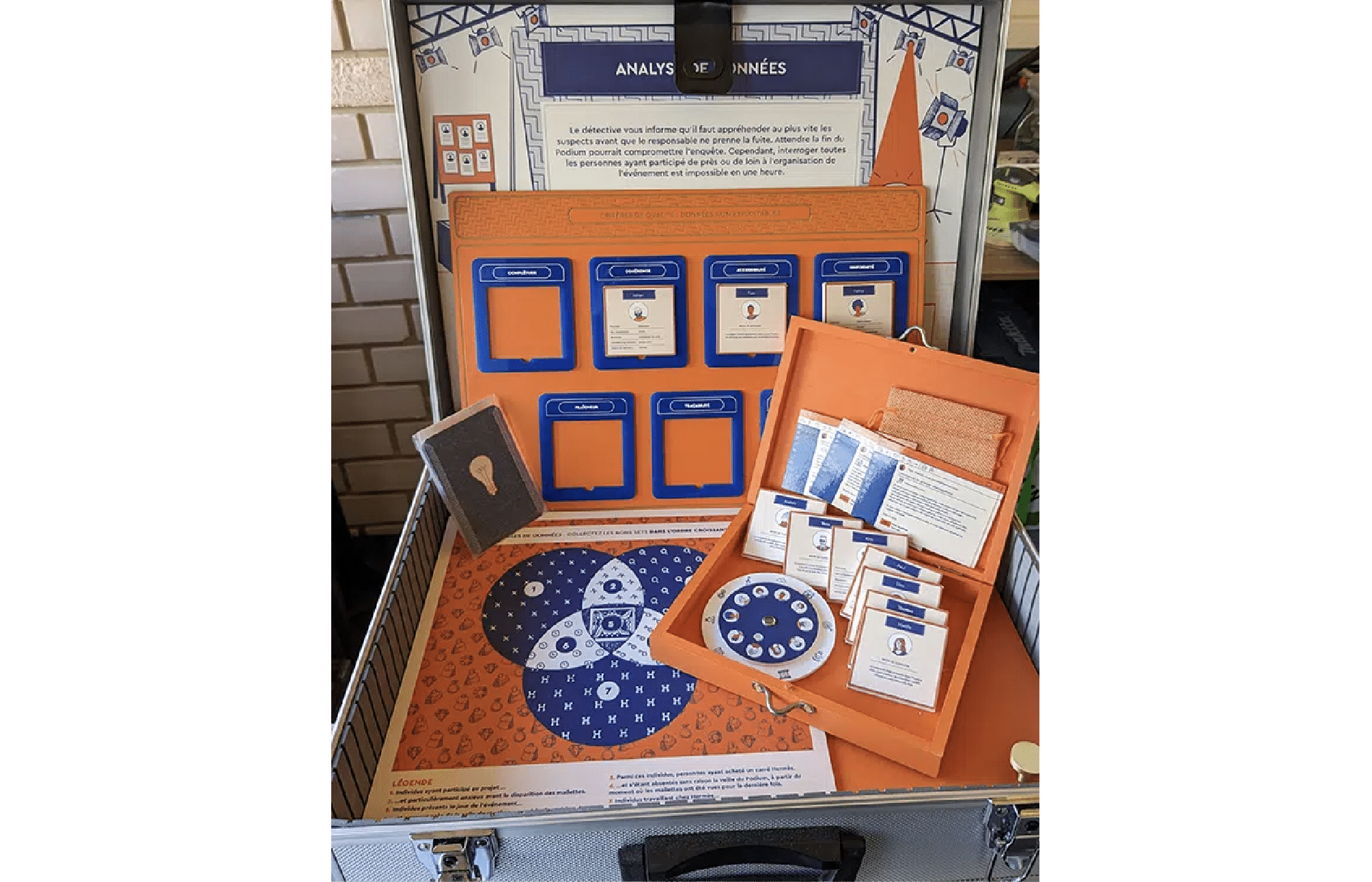
Advanced Features for Interactive Blended Learning
Our Serious Games are more than just learning games. On the digital side, they incorporate features that optimise the user experience and boost participant engagement:
Automated Game Master: A virtual character guides players through the game. It provides them with clues when they get stuck, making the game completely autonomous and fluid.
Solo and Multiplayer Mode: Employees can play alone or in teams, depending on their learning objectives or the type of interaction they are looking for. Multiplayer mode encourages collaboration and exchange between colleagues.
Real-time Player Tracking: Players can track their progress and that of their colleagues in real time, encouraging healthy competition and boosting commitment.
Dynamic Ranking: Players can check their ranking, either live or at the end of the game. Several ranking options are available: by country, region, department, etc., to add a competitive dimension.
Customised Scoring: Together we define the rules for awarding points (response time, quality of answers, exploration, etc.) to match your company’s learning objectives.
Point Rewards: The points earned can be converted into rewards such as gifts, goodies or even donations to charities, which motivates participants even more.
Customised Back Office: A customised dashboard can be used to monitor participants’ KPIs, such as time taken, number of errors, etc. The game can also be connected to your PowerBI for further analysis of the results.
Customised Avatars: Employees can personalise their avatars, adding an extra dimension of fun to the game experience.
The Benefits of Blending Learning for Employee Training
Blended Learning featuring digital games offers an innovative approach to tackling complex or technical subjects while maintaining learners’ interest. Here are some of the benefits of this method:
Active and participative learning
Unlike passive training, Digital Learning Games encourage active participation by learners. This encourages better assimilation of content and greater commitment from employees, as learning is perceived as less boring.
Enhanced engagement thanks to immersive features
Scoring systems, personalised avatars and live rankings capture the attention of participants. These gamified elements maintain their interest throughout the course.
Accessibility and simplicity
Digital Learning Games are designed to appeal to all profiles, whether they are experienced digital users or novices. Intuitive design and engaging scenarios make the games accessible to everyone despite different levels of tech-savviness.
Enhancing team cohesion
The multiplayer mode, combined with chat, video and audio functionalities, enables teams to collaborate in real time, share ideas and find solutions together to the challenges in the game. This strengthens cohesion and sharing between colleagues.
Immersive, realistic scenarios
Learning video games immerse players in realistic scenarios, where they have to apply their knowledge to solve problems. This process helps them to retain information more effectively and apply the concepts they have learned in practical terms.
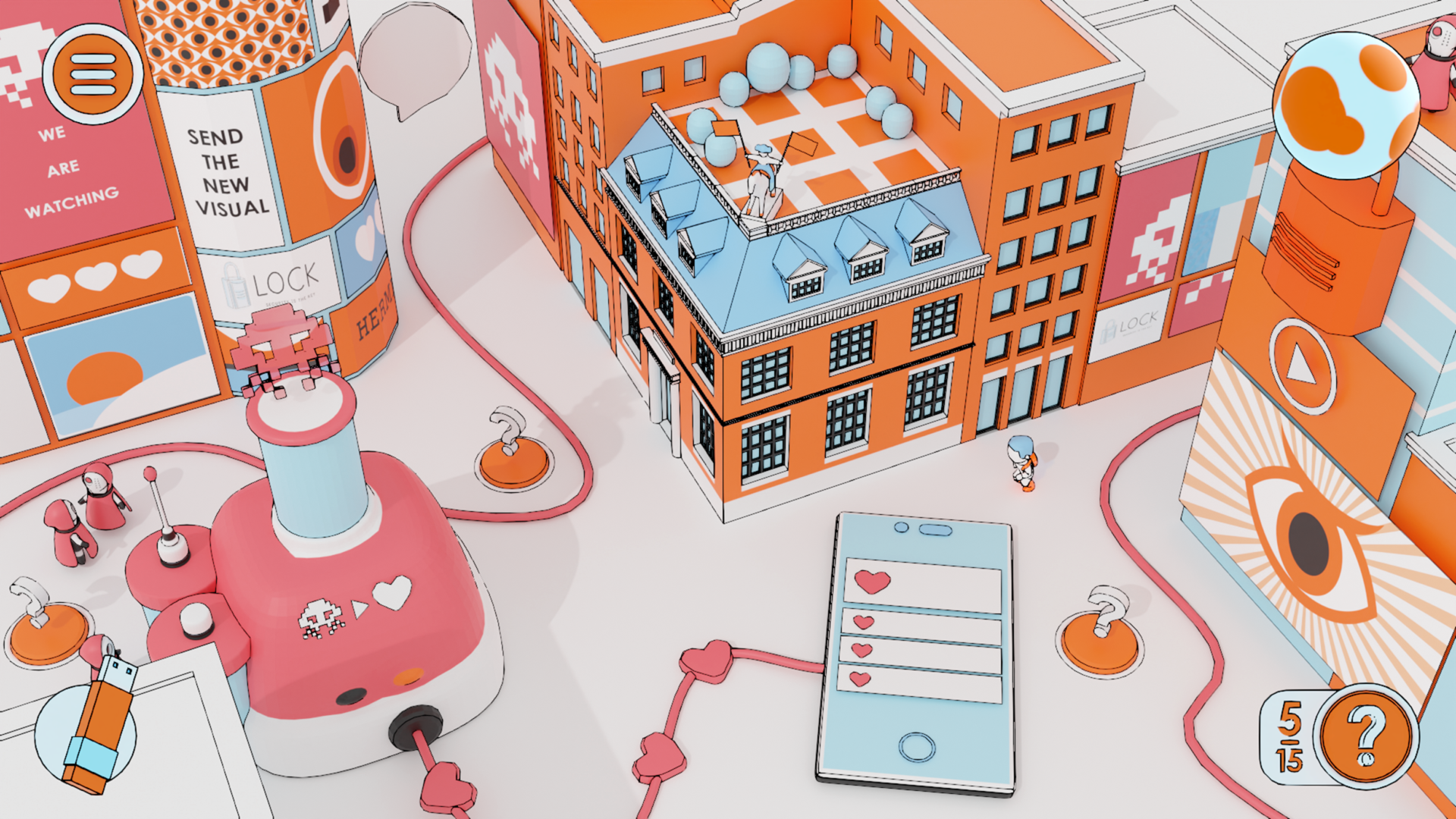
Artificial Intelligence (AI) and Blended Learning
Thanks to AI, our games are able to adapt in real time to players’ actions, offering a personalised and dynamic experience. AI adjusts the difficulty of tasks, proposes challenges adapted to each player’s performance, and provides instant feedback to improve learning.
This adaptability makes Serious Games more effective in Blended Learning, ensuring that each participant progresses at their own pace, while remaining motivated and engaged. What’s more, AI collects and analyses data on learning behaviour, enabling companies to optimise their training programmes based on the results obtained.
Different Game Formats for Blended Learning in Companies
Here are five game formats that are particularly well-suited to Blended Learning: the Escape Game, the simulation game, microlearning, the open world, and the investigative game (Cluedo).
1. Virtual Escape Room: Immersion and collaboration, face-to-face or online
The Escape Game is a captivating format that places participants in a fictitious environment where they must solve a series of enigmas and challenges to ‘escape’ within a limited time. As part of blended learning, this format can be used face-to-face to reinforce team cohesion and collaborative learning, but it can also take place online, offering the flexibility of remote access. The Escape Game stimulates rapid decision-making, communication and team spirit – essential skills in a professional context. This immersion in problem-solving scenarios is particularly effective for acquiring complex skills such as stress management, communication and conflict resolution.
2. Simulation Games: Realistic Practice and Decision Making
Simulation games are ideal for blended learning, as they faithfully reproduce work environments where participants can practise specific skills without real risk. This format lends itself well to learning technical tasks or processes, such as project management, the use of specific machines, or simulating meetings with customers. In a blended learning context, employees can first try out situations online to acquire the basics, then deepen their knowledge in the classroom with feedback sessions. Simulation games enable learners to make decisions in real time, reinforcing their ability to apply theoretical skills in practical contexts and in complete safety.
3. Microlearning: Flexibility and Accessibility for Continuous Learning
Microlearning is particularly well suited to blended learning, as it consists of short learning sessions, ideal for integrating knowledge in a progressive and targeted way. Microlearning modules can be easily consulted online, enabling learners to take independent training at any time between two face-to-face training sessions. This format is useful for learning specific concepts, revising procedures or preparing for face-to-face exercises. For example, an employee can follow a microlearning module to review good safety practices before a practical assessment session in the classroom. Microlearning offers the flexibility and accessibility needed to maintain pedagogical continuity throughout the training programme.
4. Open World: Exploration and autonomous learning
The open world format is an extended virtual environment where participants can freely explore and interact with different elements of the game. In a blended learning programme, this format can be used to introduce learners to general concepts online, which they can then explore in greater depth during face-to-face sessions. For example, an open world can represent an industrial site, an office or a company campus where participants discover different aspects of the business, explore documents and interact with avatars. This freedom of exploration encourages autonomous learning and initiative-taking, while providing a knowledge base that learners can exploit in greater detail during face-to-face workshops or group sessions.
5. Cluedo: Logical Deduction and Collaborative Analysis
The enquiry game format, inspired by the famous game Cluedo, is ideal for teaching analysis, logic and complex problem solving. As part of blended learning, this format allows employees to work in teams to solve a fictitious situation using the information gathered during the online training. For example, an investigation game might involve analysing a fictitious security incident to identify its causes and weaknesses. Learners have to collect and interpret clues, pose hypotheses and formulate solutions, thereby reinforcing their analytical and collaborative skills. This format is particularly enriching during face-to-face sessions, where participants can share their deductions, compare their reasoning and draw common lessons, while building on the foundations acquired online.
Examples of Serious Games
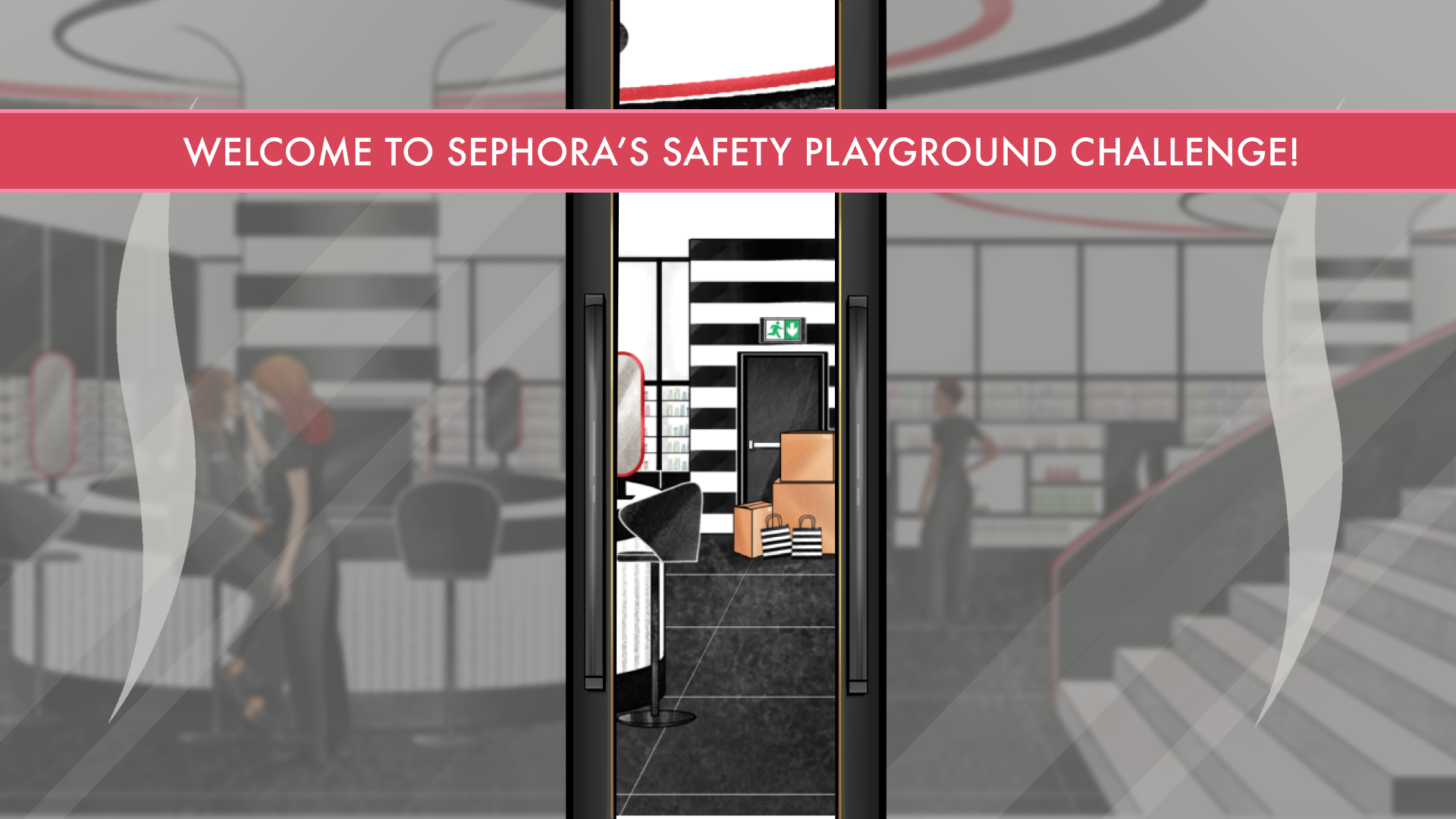
1. Sephora: Improving safety in the workplace
Sephora used a Serious Game to train its teams in safety practices in shops and offices. The game raised employee awareness of safety protocols in a fun and engaging way, while ensuring better adoption of good practice.
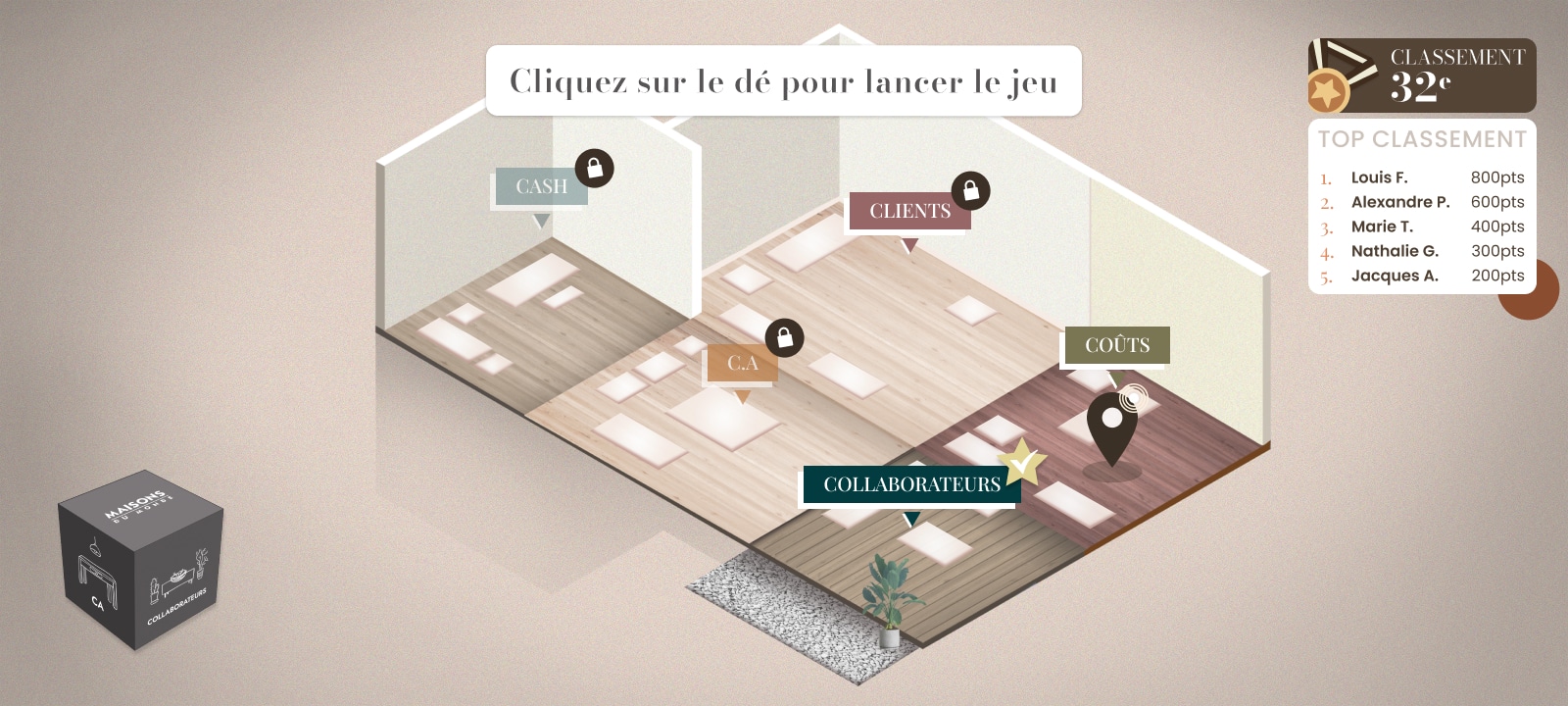
2. Maisons du Monde: Change management
Maisons du Monde integrated a Serious Game to support a major organisational change. The game actively involved employees in this transformation process by offering them interactive scenarios tailored to their jobs.

3. Dior Gamified HR onboarding: Microlearning
This Serious Game was designed to facilitate the integration of new employees into the company via microlearning modules. All new comers worldwide were able to discover the company’s values and culture at their own pace, while remaining motivated thanks to the gamification elements.
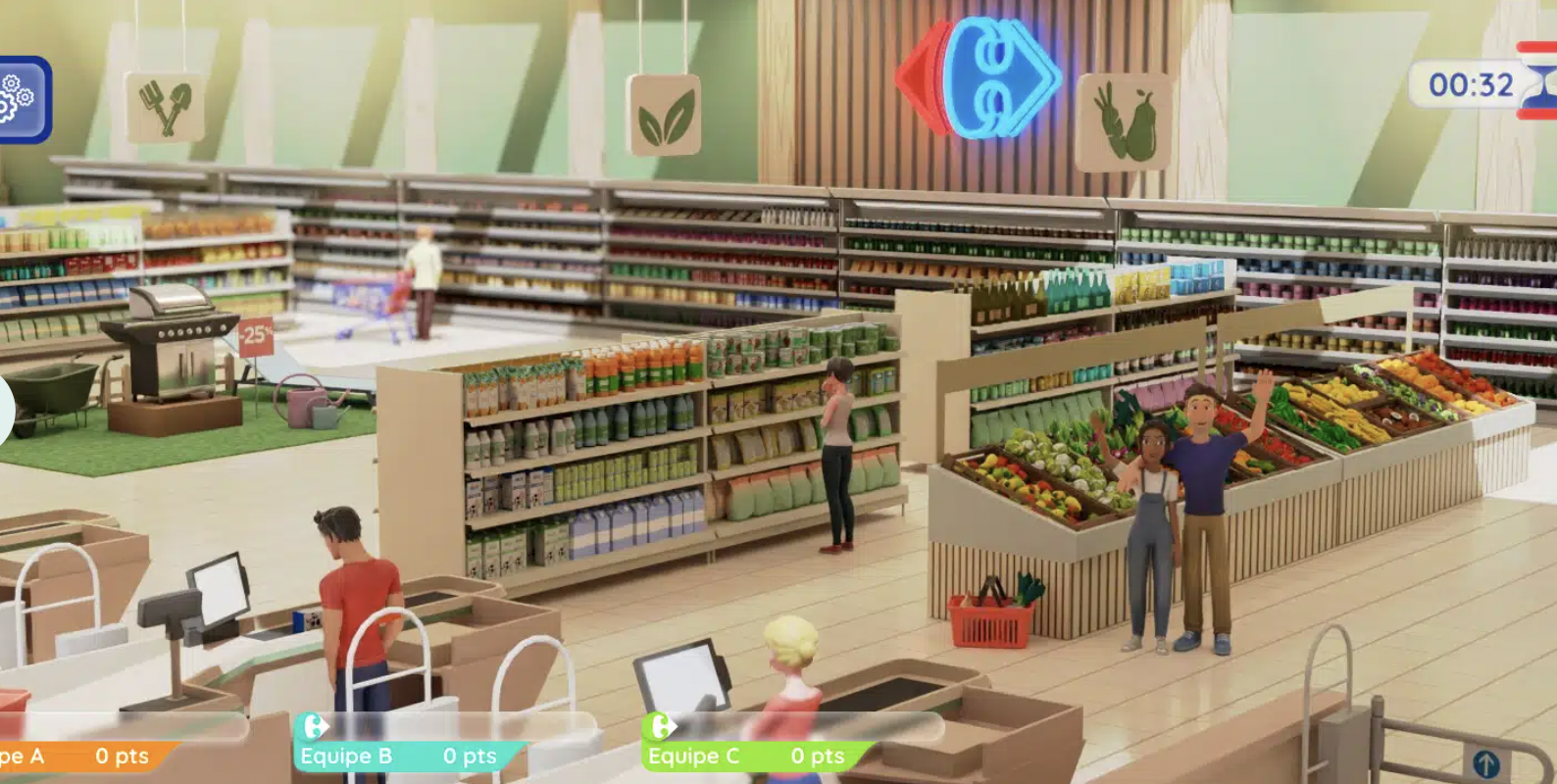
4. Carrefour: Retail, Digital and E-commerce
Carrefour used a Serious Game to train its teams in digital and e-commerce in the retail sector. This game has helped to strengthen the digital skills of employees in an interactive way, while improving their understanding of the challenges of e-commerce.

Lancôme set up a Serious Game to train its sales teams for new products knowledge. The game made the training more dynamic by making learning more fun and more immersive, thus ensuring better retention of information.
Depending on its complexity, it takes from 20 days to 3 months to design a tailor-made digital game for blended learning.
There is no limit of players because you own 100% of the game. You can use it as many times as you want. Our servers can welcome up to 200,000 players simultaneously.
Creating a tailor-made digital game for blended learning requires a team of more than 8 people (Game Designers, designers, developers …). The cost is available upon request through our contact form.
Results
-
Improves autonomy of learners according to their priorities.
-
Traceability of training modules started and completed.
-
Engages learners through play.

How to play ?
Memorize the order in which the different blocks of the circle are illuminated, then reproduce it in the same order by clicking on it.
Book A Demo
Get a personalized demonstration by one of our game design experts.
Formats
 AI-based Serious Game
AI-based Serious Game
Integrate Artificial Intelligence in Serious Games for a dynamic and scalable experience
 Open World/ Metaverse
Open World/ Metaverse
Project participants into a custom-made virtual world in metaverse.
 Virtual Scavenger Hunt
Virtual Scavenger Hunt
Boost employee engagement and learning fun with a virtual scavenger hunt
 Simulation Game
Simulation Game
Reproduce situations as close to reality as possible to prepare your teams.
 Interactive Video
Interactive Video
A realistic and interactive format for players to become main characters within the plot. Will they make the right choices?
 Speed Gaming
Speed Gaming
Inspired by speed dating, bring together, at random, players from your company for a series of short ice-breaking games, to help team bonding.
 Digital Cluedo
Digital Cluedo
Inquire, question, and investigate! Cluedo mobilizes the whole team to reveal the long-awaited truth with a series of clues
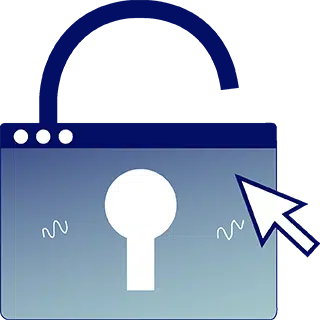 Digital Escape Room
Digital Escape Room
Players will have to search, open chests, discover new rooms, and solve a series of puzzles in a limited time.
 Physical Escape Room / Hybrid
Physical Escape Room / Hybrid
A physical or hybrid immersive escape game experience.


